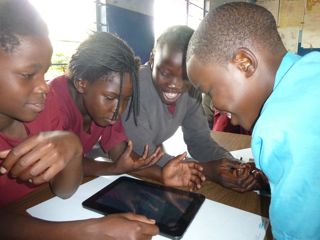ARCHIVE: This material is no longer maintained and should be viewed for reference only
The DFID-funded "Investigation of appropriate new technologies to support interactive teaching in Zambian schools" (part of the "New and Emerging Technologies Research Competition"), was a joint project between Aptivate, the Centre for Commonwealth Education, and iSchool.zm (Zambia), running between October 2010 - April 2011.

We were looking at new and emerging information and Communication Technologies (ICTs) in the area of primary education. Building on our substantial literature review on developments in using ICT to enhance teaching and learning in sub-Saharan Africa, as well as existing projects and NGO work, we investigated how this prior educational technology understanding can be applied to a particular education system in a sub-Saharan country, Zambia, rated one of the lowest developed countries globally (164/182 on the HDI). The overarching goal of this project was to determine how innovative approaches to using educational technologies in conjunction with appropriate pedagogies and learning resources can significantly improve teaching and learning in primary schools in Zambia.
The key question was: Based on our understanding of ICT use in schools and of successful pedagogies such as interactive teaching plus collaborative, project- and enquiry-based learning, and given limited resources, what does an effective ICT-enabled Zambian school look like? Moreover, how can one bring existing initiatives and stakeholders together in synergy to realise this model in a sustainable way?
 To address these questions, we participatively compared a number of class-sized sets of different technologies emerging as most promising, including laptops and handheld devices such as tablet PCs, different netbooks (e.g. those aimed at the education sector, those with low-energy screens), WikiReaders, Kindles, calculators plus supportive non-digital tools, such as standard wipe-clean slates and tape measures.
To address these questions, we participatively compared a number of class-sized sets of different technologies emerging as most promising, including laptops and handheld devices such as tablet PCs, different netbooks (e.g. those aimed at the education sector, those with low-energy screens), WikiReaders, Kindles, calculators plus supportive non-digital tools, such as standard wipe-clean slates and tape measures.
Teachers were developing model lesson plans around the chosen ICTs, paying particular attention to adopting active, collaborative, enquiry-based learning approaches that research indicates are most effective, while addressing issues of gender equity. Each set of technologies was trialled in different school contexts, where we gathered qualitative data concerning effectiveness. Criteria for evaluation included usability, software/resource availability, power requirements, robustness, and integration with interactive teaching. Towards the end of the project, we tentatively generalised the findings to other similar school settings.
News
The ANTSIT project is featured in the Humanitarian Centre's 2011 Cambridge International Development report: ICTD4 (see page 27):http://www.humanitariancentre.org/wp-content/uploads/2010/09/2011-International-Development-Report.pdf
Outputs:
An investigation of appropriate new technologies to support interactive teaching in Zambian schools (ANTSIT); A joint report from Aptivate and the Centre for Commonwealth Education (University of Cambridge). Final Report to DfID. (March 2011) Björn Haßler, Sara Hennessy, Tom Lord, Andrew Cross, Alan Jackson, Matthew Simpson
ANTSIT presentation at Mobile Technologies for Education: The experience in the developing world. Seminar jointly hosted by the Humanitarian Centre and the Centre for Commonwealth Education (30 March 2011). Click on the link to view screen recording of Prezi presentation by Björn Haßler and Sara Hennessy: http://sms.cam.ac.uk/media/1125779
